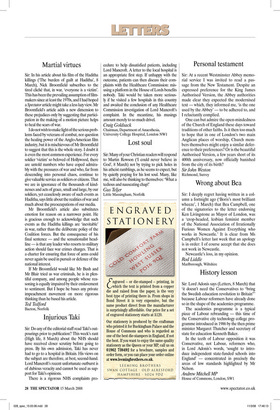Martial virtues
Sir: In his article about his film of the Haditha killings (‘The burden of guilt at Haditha’, 8 March), Nick Broomfield subscribes to the tired cliché that, in war, ‘everyone is a victim’. This has been the prevailing assumption of filmmakers since at least the 1970s, and I had hoped a Spectator article might take a less lazy view. Mr Broomfield’s article adds a new dimension to these prejudices only by suggesting that participation in the making of a motion picture helps to heal the scars of war.
I do not wish to make light of the serious problems faced by veterans of combat, nor question the healing power of the Anglo-American film industry, but it is mischievous of Mr Broomfield to suggest that this is the whole story. I doubt it is even the most common experience. For every soldier ‘victim’ so beloved of Hollywood, there are untold numbers who have coped admirably with the pressures of war and who, far from descending into personal chaos, continue to give valuable service as soldiers or citizens. That we are in ignorance of the thousands of kindnesses and acts of grace, small and large, by our soldiers, yet ceaselessly aware of such events as Haditha, says little about the realities of war and much about the preoccupations of our media.
Mr Broomfield’s article also substitutes emotion for reason on a narrower point. He is gracious enough to acknowledge that such events as the Haditha killings are ‘inevitable’ in war, rather than the deliberate policy of the Coalition forces. But the consequence of his final sentence — and the sensationalist headline — is that any leader who resorts to military action should face war crimes charges. That is a charter for ensuring that force of arms could never again be used in pursuit or defence of the national interest.
If Mr Broomfield would like Mr Bush and Mr Blair tried as war criminals, he is in plentiful company, and among people whose reasoning is equally impaired by their enslavement to sentiment. But I hope he bases any private impeachment movement on more rigorous thinking than he based his article.
Ted Tedford
Bacton, Norfolk


























































































 Previous page
Previous page